Kayaking to Buddha: A journey to Koh Kaew and back
Guest post by Keith Fitzgerald
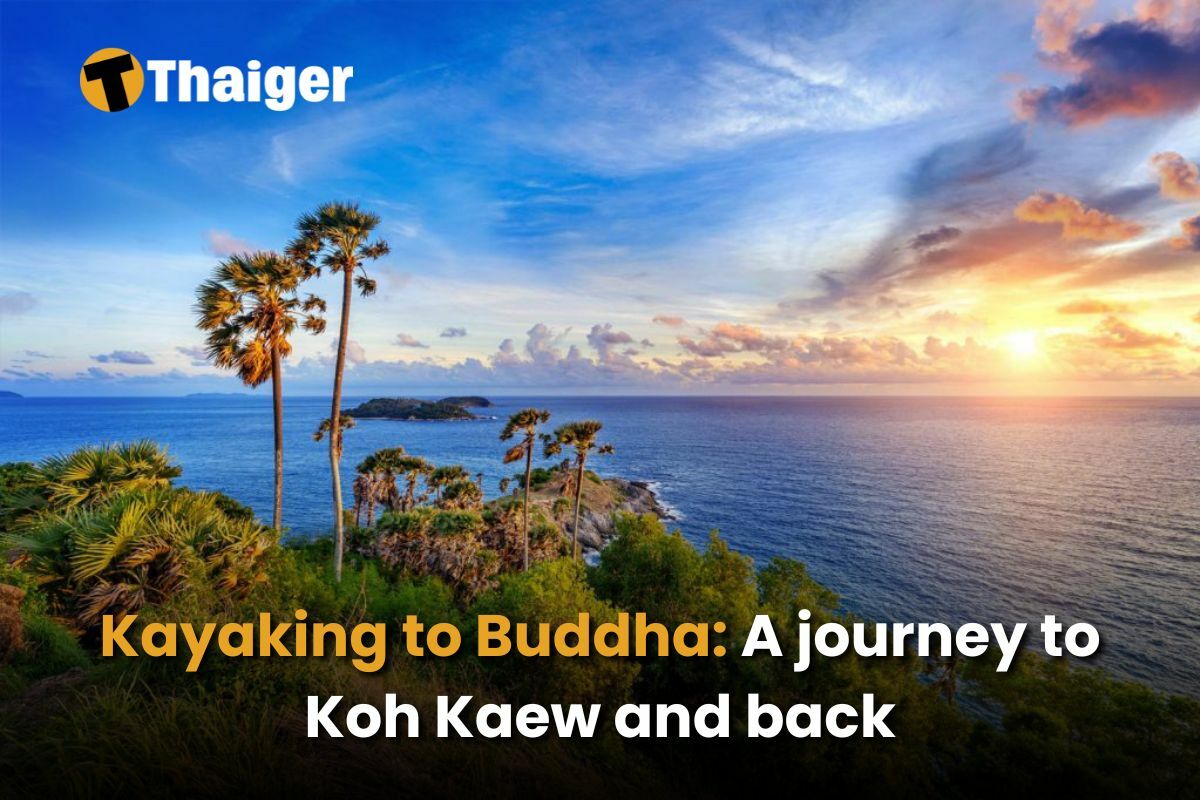
I head over to a little beach in Rawai called Ya Nui to rent a kayak for 100 baht (US$3) an hour and paddle out into the beautiful Andaman Sea at the southern end of Phuket island. Since I was a kid, I’ve had this fantasy of rowing on a tranquil blue-green sea, floating around, maybe jumping in for a swim.
I paddle first toward Man (pronounced as mahn) Island just across from the beach because the kayak-rental guy told me it’s a good place to snorkel. When I get up close to the rocky edge of this isle, with no beaches, I see an American couple struggling because of all the sharp rocks and the lack of any place to get a foothold. They had swum here from the beach.
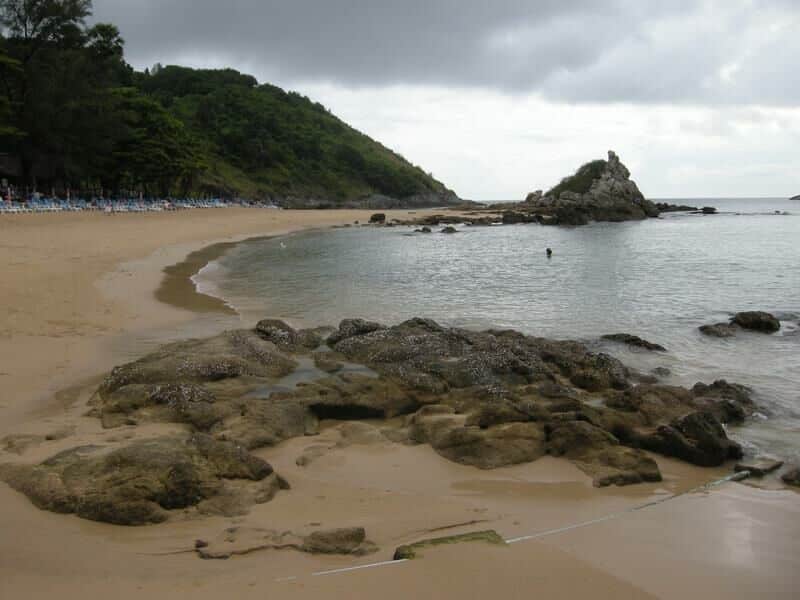
I see nowhere to tie up the kayak so I can commune with tropical fish, so I navigate around the island and out to the sea.
I am determined to get all the way to Buddha Island, which is what foreigners call it. The real name is Koh Kaew Pisadon. It means Magic Glass Island, though I’m not sure why exactly. My bed sheet and floor have bloodstains on them now.
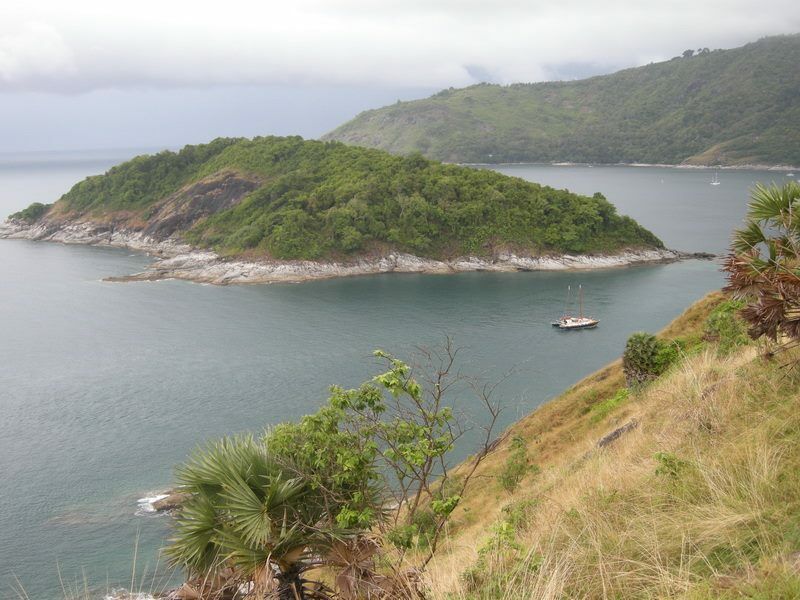
Magic Glass / Buddha Island is about a mile from Cape Promthep, the end of the land. No one rows kayaks or anything else out here. But I see a man in a strange hat, foot-paddling what looks like a combination catamaran-sailboat-bicycle. He’s so relaxed and comfortable, drinking bottled water. I curse him for it.
As is my way, I haven’t prepared at all. It reminded me of that time I did a 10-hour hike through South Korea’s Wolchulsan National Park without taking any water. That journey took me up high peaks and to an ancient stone Buddha, which I nearly dropped dead trying to get to, even though I am as atheist as a toad.
The kayak moves. I move it. After a few minutes, the point hits home that I’m not in good shape. Acute shoulder pain, with every stroke sending a shot of it. Still, on that first leg, after I pass beyond Man Island, I am in the paradise I’d longed for.
Out in the distance, I see some longtail boats and a fishing vessel. The figures of tourists on the bluffs of Cape Promthep, especially Muslims from the deep south who go there every day.
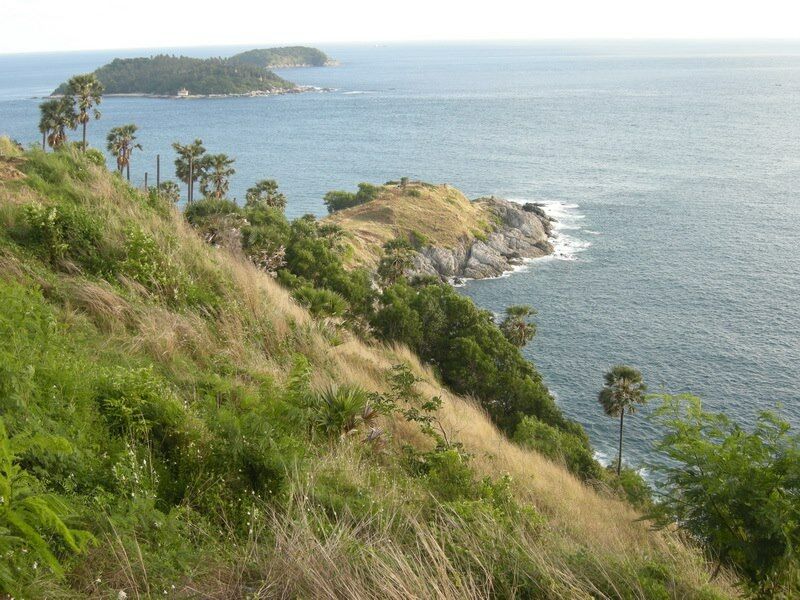
I can see my destination. From this far out, I can tell that the Buddhist statues are garish gold, rather new, and nothing to die for in a kayak, without a life raft, anything to drink, or anyone to rescue me if another tsunami hits.
At the north end of Ya Nui beach, there is a plaque to Heather, from her love, who lost her on December 26, 2004. The kayak man told me that three people were killed at this beach, all foreigners. The tidal waters went one kilometre inland. Out of over 5,000 people whose names we have, nearly 4,000 are still unaccounted for.
At a certain point in my now-slow row to the Buddhas, the waters get a bit choppy. Nothing big enough to even splash into my boat, but the fear strikes. What if it is a tsunami? I’d be swallowed up, and no one would ever know. I’d just go missing forever.
That passes after a few minutes. I catch ahold of reason. I keep rowing, through the stabs of pain and the lovely water.
Man Island, Ya Nui, and Cape Promthep recede. Closer and closer to my goal and exhausted, I paddle straight toward where I see stairs. I will dock there and tie up my boat. Then go exploring, find a place to swim, take pictures, and head back.
Maybe it took an hour from where I started to Scylla and Charybdis. I steer my craft to the only point where it looks like I might be able to moor it. The closer I get, the rougher the current. Sometimes, it seems like I can cut a quick path to a safe place to land.
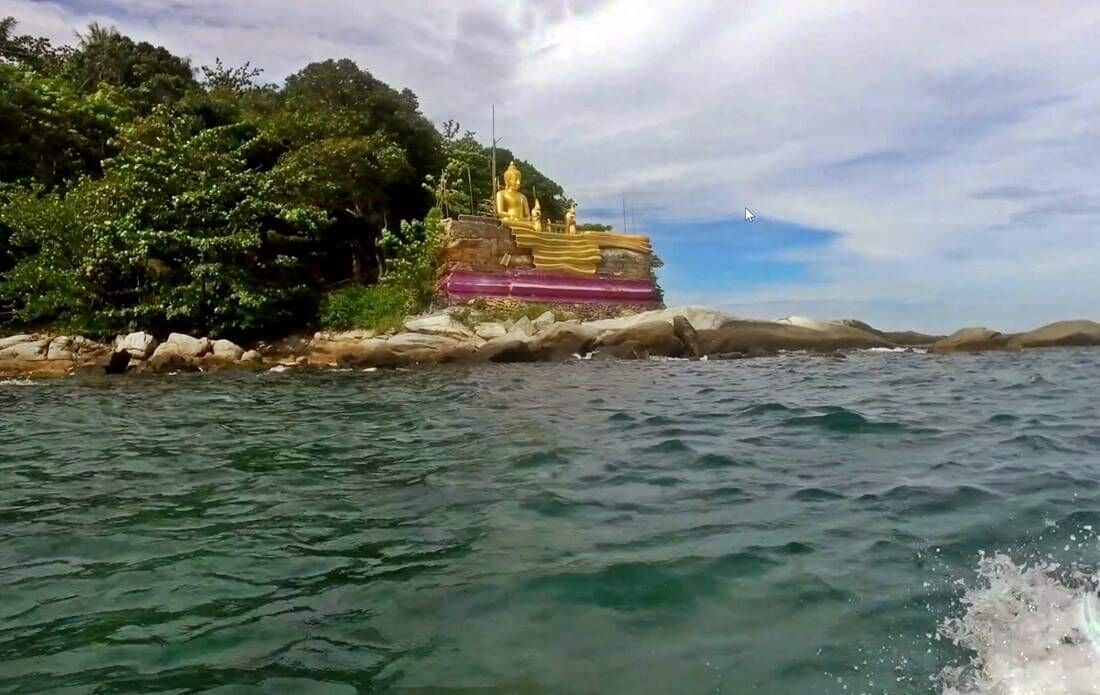
Two seconds later, the waves are enough to make a mess of me against the rocks. I try to get into a notch. Can’t control the kayak. I don’t have the experience. Anyone who did wouldn’t think to land here. I see nowhere else to do it.
First try, I closely avert a disaster: capsizing, losing the oar, and my waterproof plastic duffel bag with my wallet, camera, and keys. Worse than that, I avoid being smashed against the rocks covered with razor-like barnacles.
My heart is racing, and I have to be calm. I wait and let the water settle. I watch what it is doing, and when it calms, I’ll use the oar to get into a slot where the kayak sticks, and I’ll scramble out, take my bag and oar, tie the boat to a post, and go see shiny Buddhas.
A few small cuts and then success, but I can’t fret about how the hell I’m going to get out of there after I explore the island. Everything in its time.
After tying up the kayak, I go up the stairs to the peak. Near the top, a man with a mean face and half a right foot. No Thai smile. More like: What are you doing here? Go away or I’ll steal your yellow kayak and leave you here to rot after I get your money.
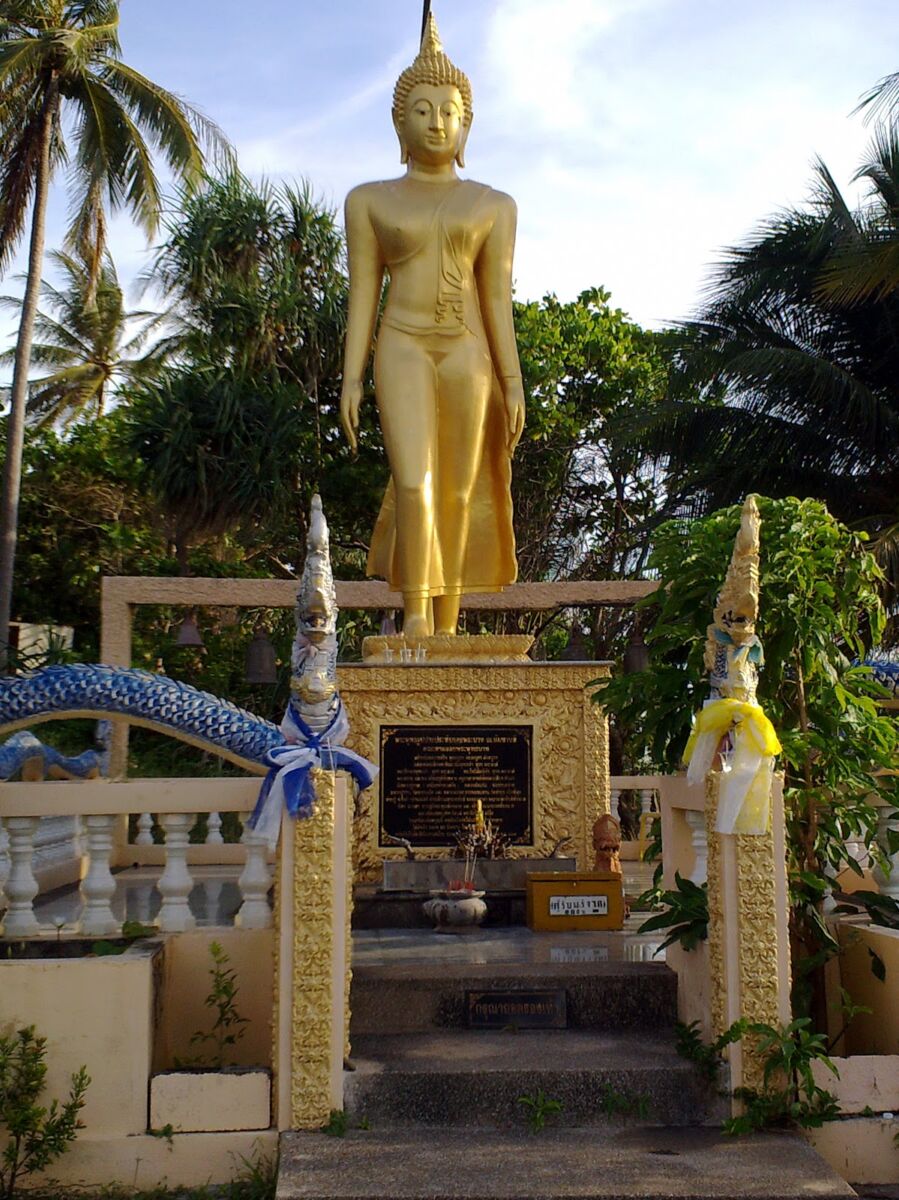
I take pictures of a Buddha who looks out toward Man Island, then I head for a little chapel, which is dirty and has a green glass Buddha in a glass booth. Near the entrance, there’s a magazine featuring photos of people with eerie deformities and various severed appendages.
Back on the path and down the hill through a forest and ratty dorm rooms for the monks. Maybe people like the glaring half-footed man.
Then, down to a building on a little beach that looks like a temple but is not. I should have rowed to this place.
In front of this structure, at a long table, sits a 75 year old monk smoking Marlboro Golds. His body is tattooed all over, and tufts of hair sprout off the edges of his ears. Not from inside, like you see with some guys. These are like those ancient whiskers on a Chinese chin. He speaks Thai to me a lot and is not deterred by the fact that I have no clue what he’s saying. A lady gets me some orange juice and a glass of ice and cleans the table.
I drink the juice, and they offer me more. They also offer me water, which I say no to because I am shy, and I am a fool.
Then, I go down to the beach, and four very friendly black dogs surround me, greet me, and ask me to take them with me. I tell them there is no room for more than one of them on my boat, and I might not make it back anyway. Best to stay here as strays on the beach. The monks and the ladies will throw you scraps of food.
I head over to the main Buddha attraction – a big seated figure with a long pointed nose. He is on a sort of throne, which is wrapped by the coil of a huge Naga serpent. He looks with utter indifference at the tourists on Promthep Cape.
I check him out but am not impressed. In a shack nearby, a chubby, snoozing monk in his early 60s. Orange and brown robes dry on the line.
I go back to the black dogs, say goodbye and my thanks to Hairy Ears and the Orange Juice Lady. Then, I go back up and down the path, past the green Buddha, the shrine for dead children, the magazine of malformities, to my kayak, bright yellow in front and orange-red in the back. Some of the red is my blood.
Untie the bark, take it to the place of danger, fear, and pain, and now I understand about ships wrecked on the coast and men of the sea respecting it like no one else does because if they don’t, and even if they do, they may die in an awful way. I think if I die at sea, I will really know about being abandoned by God. I already know about it, but today I know it better.
I turn my boat around and get ready to push out into the channel between the cape and this island. The water is mean. It comes at me relentlessly, and it is making a point.
I have to get to this point. The point is: You may die today.
Don’t think you’re so special because your tribe went to the moon. I will kill you if I feel like it. The rocks and the barnacles and I will put an end to you. It will be days before anyone finds whatever is left of you.
I listen to this. The water roils between big rocks. When it lets up a bit, I try to get out. The swells and the fury come back quickly. I wait again. Stillness comes. I move the kayak out for a try. Waves rise, and I almost lose everything. The violence of it is enough to give me good judgment. I will not go if it isn’t safe.
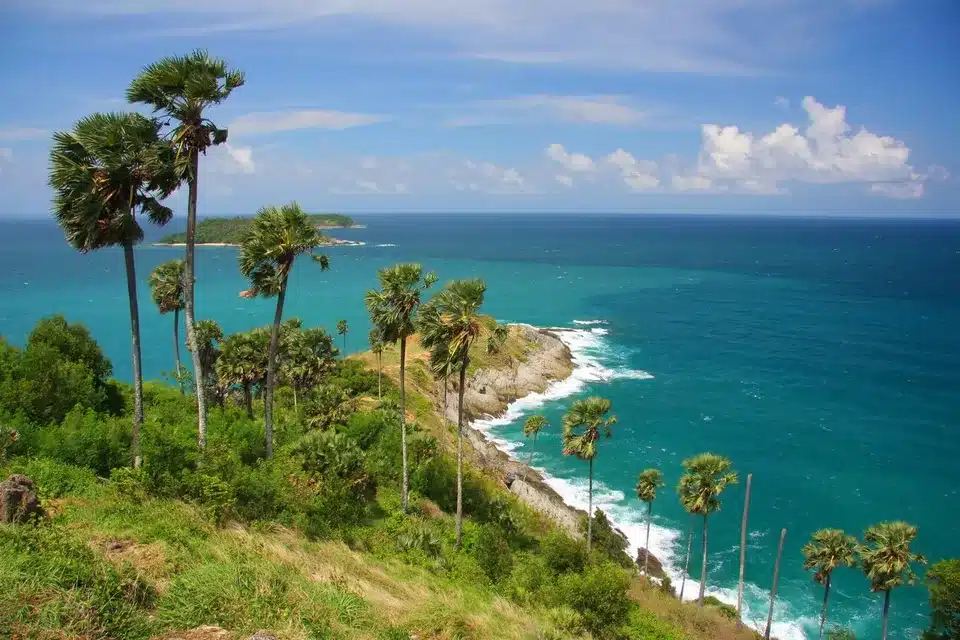
In the distance, I see a longtail boat fisherman, and he is watching me. He sees that I am stuck and in trouble. He’s way too far away for me to see his face, but I can tell he’s concerned.
He must think I’m one stupid farang, but I’m hoping he will come here and figure out some way to help me. But there’s no place for him to stop. What could he do? He could watch me get pulverised. One less potential customer.
Another longtail comes up near him. The first guy gestures toward me, as in: That guy is in trouble, and maybe we should help him, but, well, there’s nothing we can do.
They check me out for a while, then leave. Humans can be as detached as that Buddha on his perch with the Naga snake protecting him. And the sea itself.
Patience. The time comes and the sea settles. I see my chance and bolt out between the death rocks and out away from the coast. A brilliant manoeuvre by this first-time captain of his own little ship.
Rowing and rowing and rowing. Ya Nui is far. An hour from here. There is no rowing without pain. As I get closer to the cape, I see that the waves crashing against it are much more deadly than what I just escaped. I have to stay clear of that. Head out to the sea so I don’t get caught up in anything that can bring me close to that.
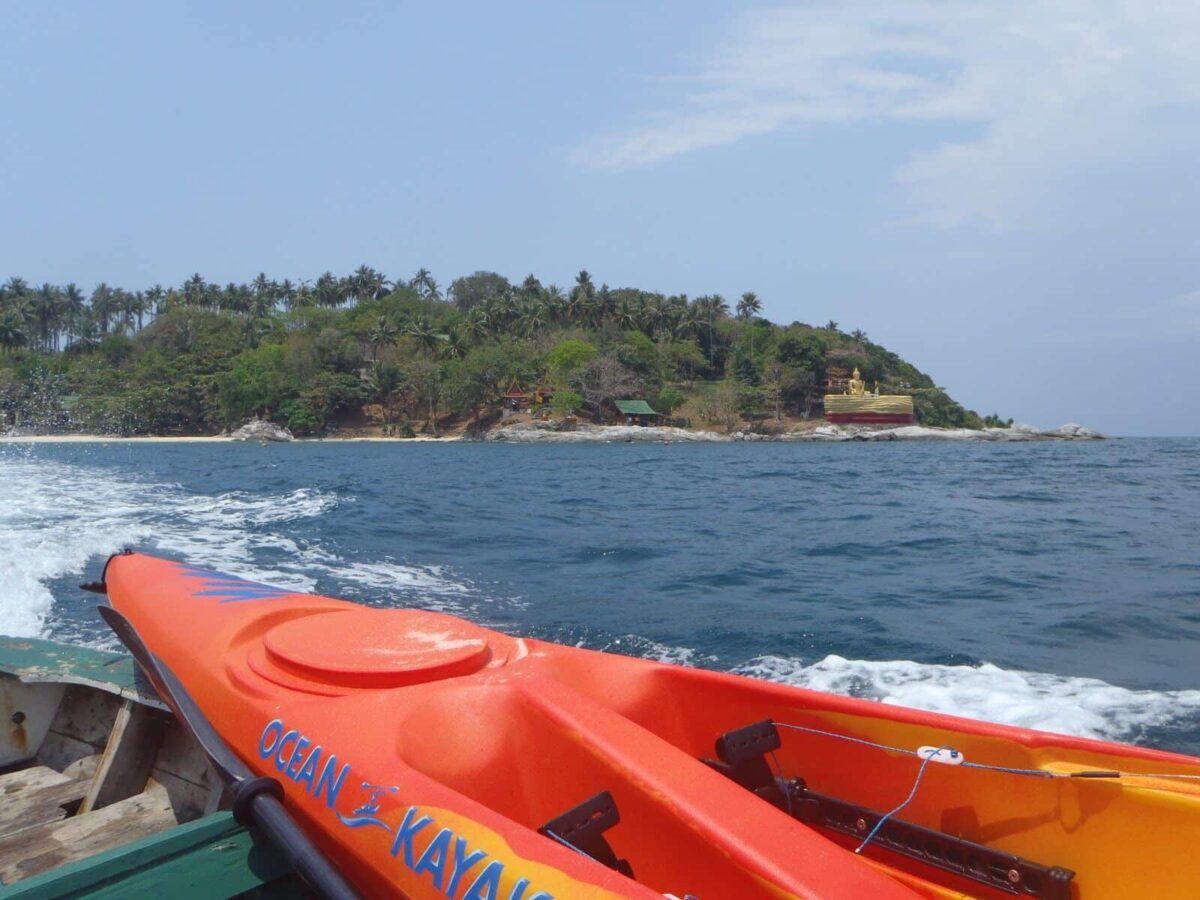
I need to drink water. I shouldn’t think about it, but I can’t stop. Shouldn’t think anything but positive thoughts. Eyes on the prize. Ya Nui Beach. Just an hour or so away. I can bear the pain. One stroke at a time. Rest if I need to. Take it slow.
But the sea is pulsing. Tsunami paranoia comes back. People on the cape are watching me. They’re thinking I am a fool, and they are waiting to see if I will die. It’d be a good show, like the Indy 500 without the crashes and flames, and they will just watch like the longtail boatmen did.
I want to drink ocean water, and now I know this is crazy. It doesn’t matter how many TV shows I’ve seen about this sort of end; I need to drink. Give me salt water!
The man in the strange boat foot-paddles past me in his bliss. He doesn’t know I’m in trouble. The trouble is in my head. Big trouble there. My shoulders are the least of it. I can’t bear to look at the surf exploding on Cape Promthep. I can’t look at the Muslim tourists from the deep south watching the Keith-goes-under show.
Row and row and row and row and row. Away from that cape which I stood at the top of just a few days ago, looked out to this sea, to Buddha Island, and wanted nothing more than to be where I am now.
But, in spite of everything, I make steady progress. The sun is going down. No one can do a thing for me if I capsize. I have to make it back because I have a comfortable bed in my tiny apartment in Rawai. Some people care for me. My book will be published.
Don’t drink the Andaman Sea. Don’t give up, no matter what. Even if a monsoon comes and darkness falls.
As I slowly get closer to home base, I notice that, though it seems like the way should be easiest coming back in because that’s where the waves are headed, in fact, it’s very hard to get any momentum. Can’t figure it out. God is dead. God is cruel. God doesn’t give a shit. God has nothing to do with this. The current is going across my bow. I am worn out. If I make it to the beach, I will put the boat in the sand and collapse.
I stay clear of Bash-Your-Brains-Out Rocks to my right. Closer and closer to safety and rest I go. Here, just near the end, there are shoals. A last danger. I navigate around them and cut a line on a current straight to the sand. The triumph of sanity.
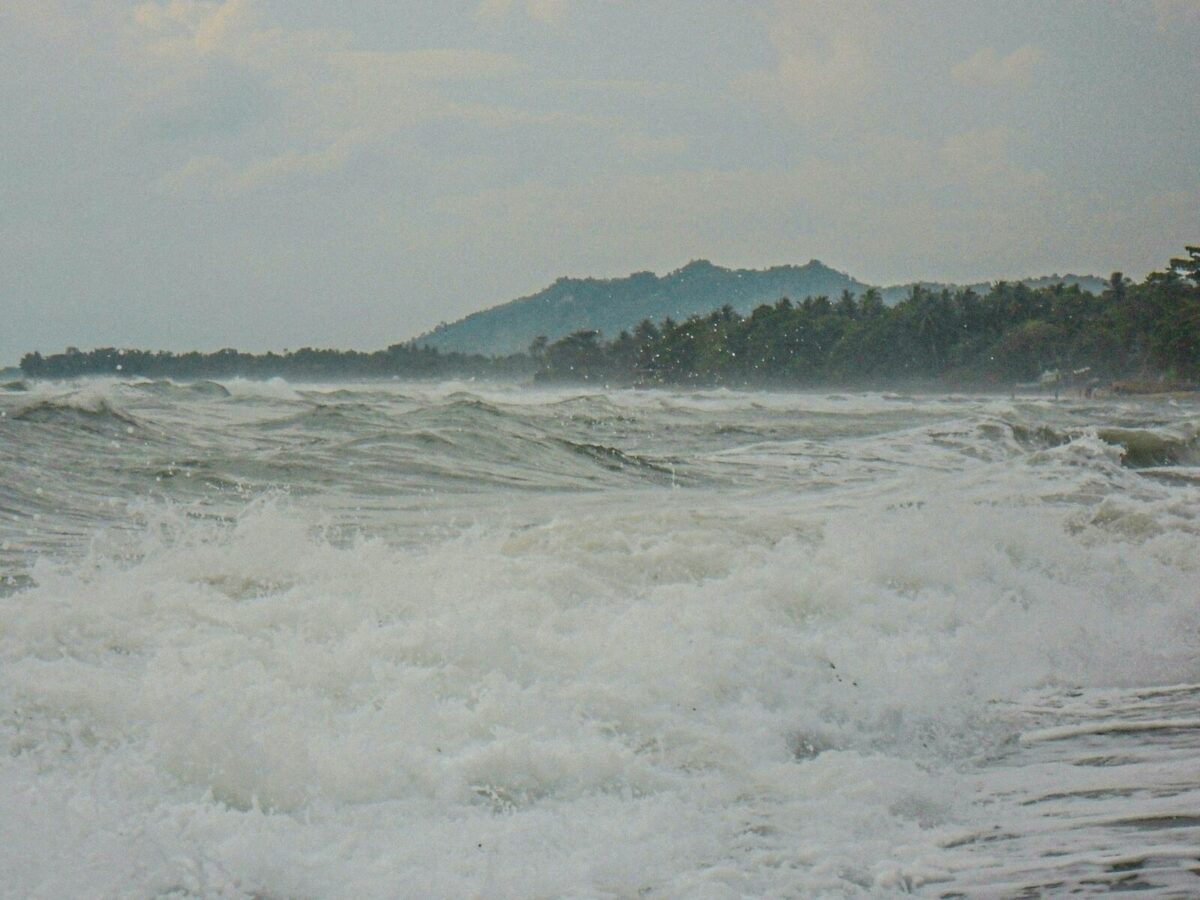
I just turn down the volume on all the demons chattering in my ears. Drink the sea. You’re sure to get sucked into a swell that’ll send you into the rocks over there. Another tsunami is coming. The people watching you want you to die.
I make it. I drag myself to the other end of the beach where I got the kayak. I need the man’s help to carry it back. He tells me he can do it himself. I say no; it’s too heavy. Just let me get some water.
We go to get the kayak. He may be Sri Lankan. He has a Muslim name, but his woman wears no headscarf. They are sweet to me. “You went to Buddha Island?” They laugh. “Crazy farang.” He doesn’t charge me for the snorkelling gear.
When I was out there in distress, I thought of how great it would be to see people again. To talk with someone. Not just to be on land. I talk with these people. The man and woman and the water and the ground on which I stand – this is the beginning.
He tells me that, in a month or two, no one will be here. The waves will be too rough. Too much wind. I ask them what they will do then. They say they have a portable noodle stand. Maybe they’ll rent out motorbikes. You get by.
Some vague thought comes to me about the three people killed here by the tsunami a little over 20 years ago. Heather and two others. There’s that sign for Heather. But the thousands of others who just disappeared – there is no sign of them.
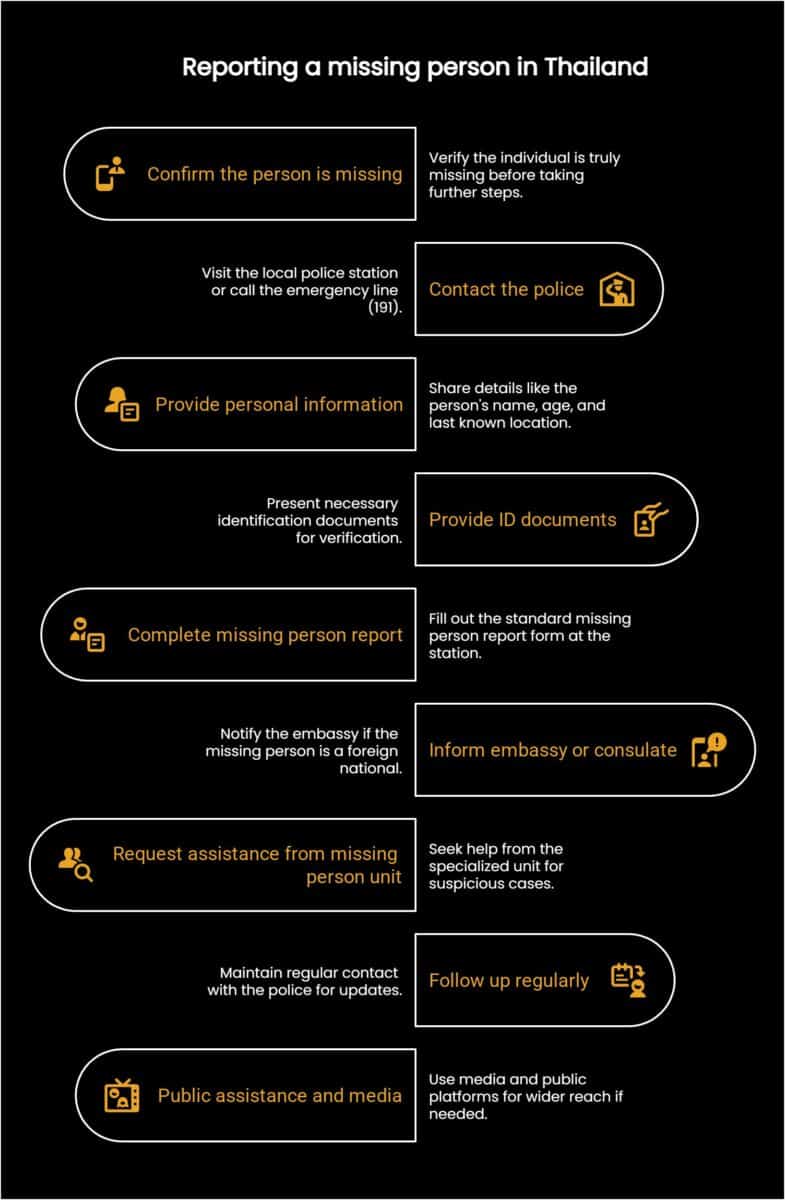
Latest Thailand News
Follow The Thaiger on Google News:


























